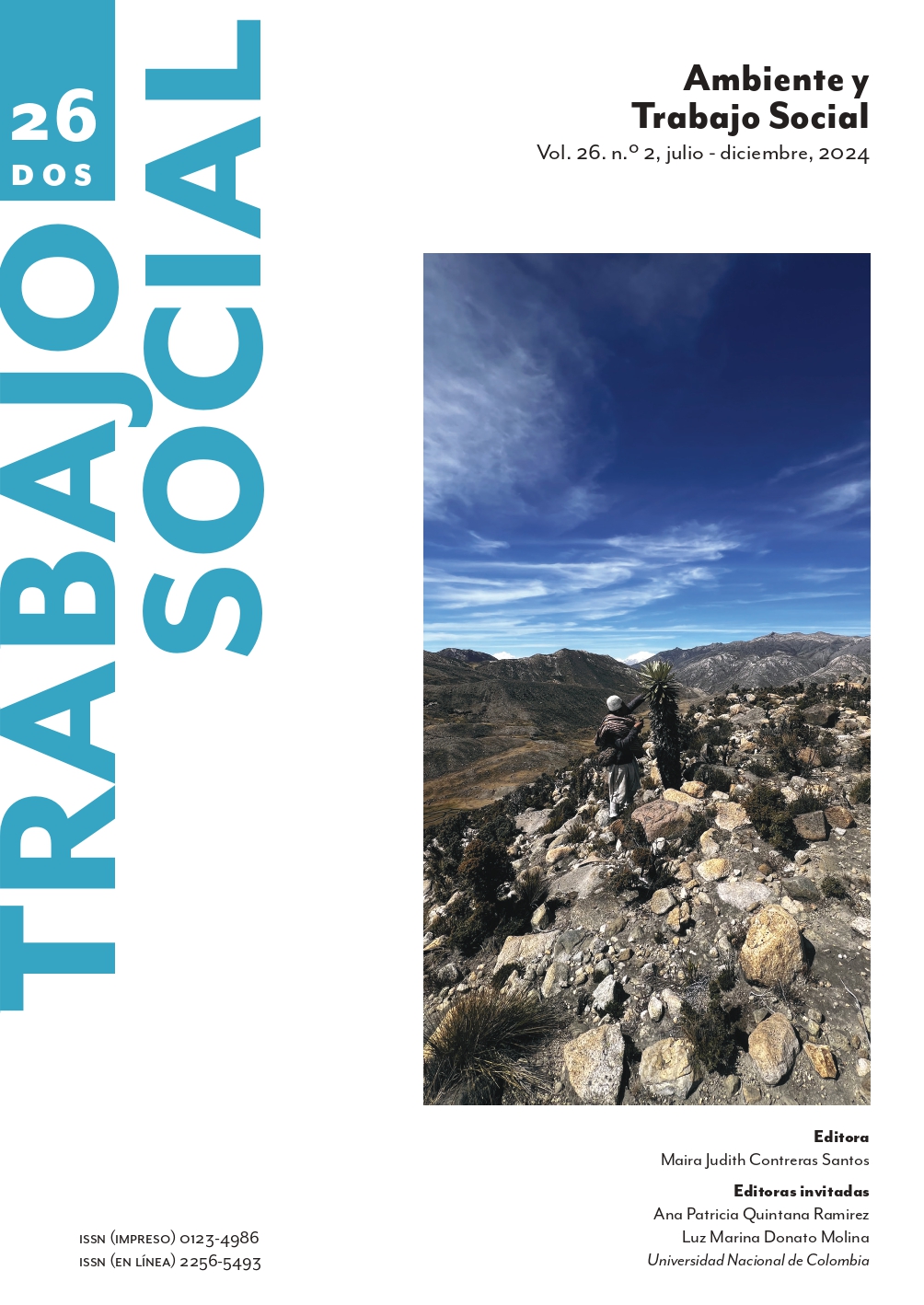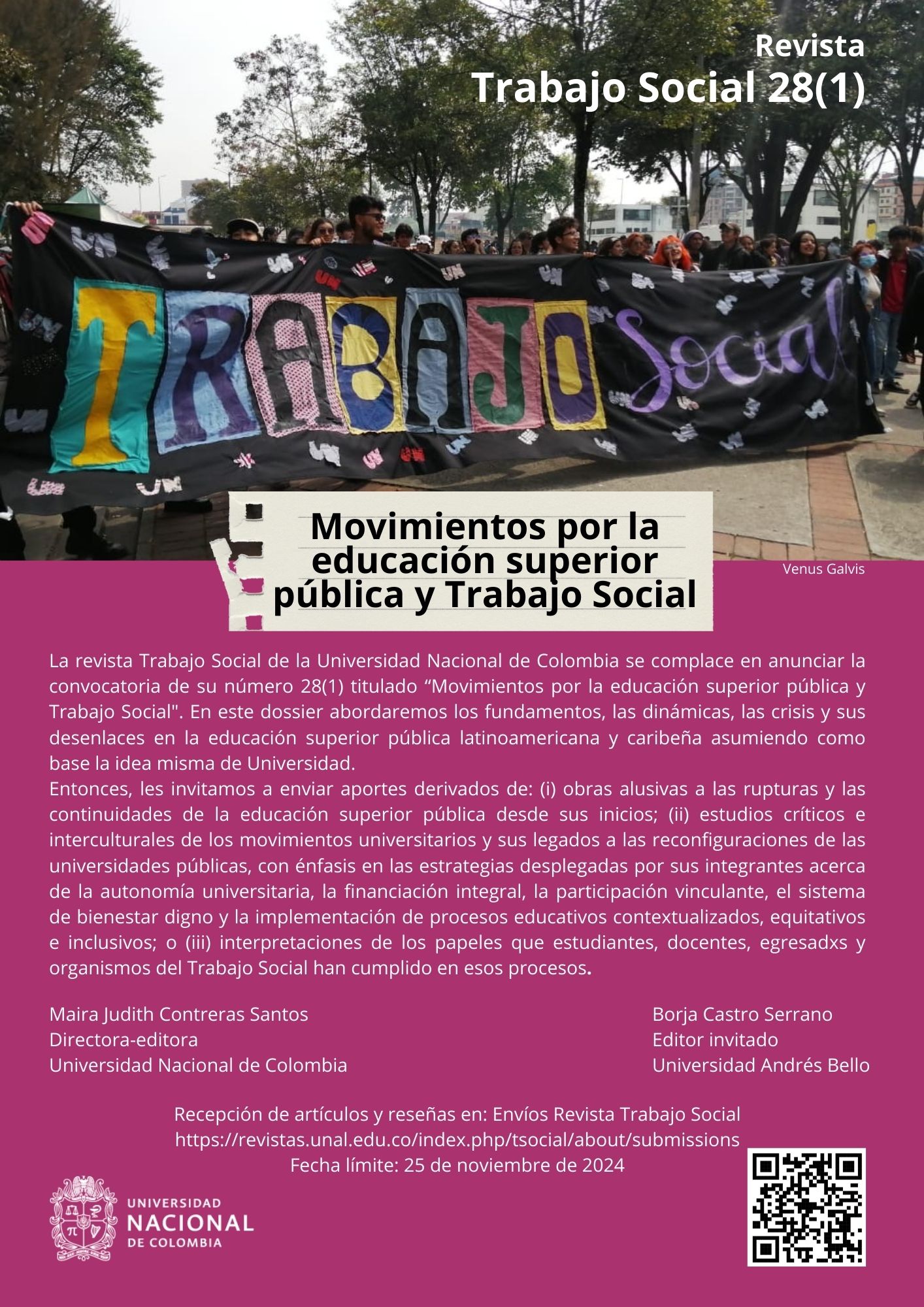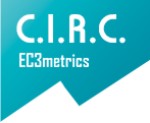Democracia y transiciones energéticas en clave comunitaria. Una aproximación documental para pensar el Trabajo Social en Colombia
Democracy and Energy Transitions from a Community Perspective: A Documentary Approach to Reflecting on Social Work in Colombia
Democracia e Transições Energéticas sob a Perspectiva Comunitária: Uma Abordagem Documental para Pensar o Trabalho Social na Colômbia
DOI:
https://doi.org/10.15446/ts.v26n2.115492Keywords:
democracia energética, transiciones energéticas, comunidad, justicia, política y trabajo socia (es)Energy democracy, energy transitions, community, justice, politics and social work. (en)
Democracia energética, transições energéticas, comunidade, justiça e política e serviço social (pt)
Downloads
En esta contribución se presenta un análisis documental sobre democracia y transiciones energéticas desde 2015, año en el que se suscribió el Acuerdo de París, hasta la actualidad. En el análisis se aportan aspectos críticos relevantes para que la disciplina del Trabajo Social reflexione sobre las transiciones energéticas en Colombia. La metodología incluyó una revisión en la que se consultaron 101 artículos de revista centrados en las categorías democracia y transiciones energéticas. La mayor producción bibliográfica se registró en revistas europeas que vinculan democracia energética con formas asociativas como energías comunitarias, comunidades, ciudadanías y cooperativas energéticas. También se encontró que la democracia energética se asocia con gobernanza participativa y justicia.
This contribution presents a documentary analysis on democracy and energy transitions from 2015, the year the Paris Agreement was signed, to the present. The analysis provides critical insights relevant for the discipline of Social Work to reflect on energy transitions in Colombia. The methodology included a review that consulted 101 journal articles focusing on the categories of democracy and energy transitions. The majority of the literature production was found in European journals that link energy democracy with associative forms such as community energy, communities, citizenship, and energy cooperatives. It was also found that energy democracy is associated with participatory governance and justice.
Nesta contribuição, apresenta-se uma análise documental sobre democracia e transições energéticas desde 2015, ano em que foi assinado o Acordo de Paris, até o presente. A análise oferece insights críticos relevantes para que a disciplina do Trabalho Social reflita sobre as transições energéticas na Colômbia. A metodologia incluiu uma revisão que consultou 101 artigos de revista focados nas categorias de democracia e transições energéticas. A maior parte da produção bibliográfica foi encontrada em revistas europeias que relacionam democracia energética com formas associativas como energia comunitária, comunidades, cidadania e cooperativas energéticas. Também foi encontrado que a democracia energética está associada à governança participativa e à justiça.
References
Baigorrotegui, G. (2018). Comunidades energéticas en la Patagonia: Tan lejos y tan cerca del extractivismo. Estudios Avanzados, (29), 56-74. http://orcid.org/0000-0002-8381-5728
Baigorrotegui, G. y Chemes, J. (2023). Comunidades energéticas latinoamericanas. Sostenedoras de transiciones que mantienen y reparan la vida. Energía y Equidad, (6), 5-13. https://www.energiayequidad.com/pdf/1.Revistas/E_y_E_2023N6_Comunidades_Energeticas_Energias_Comunitarias.pdf
Baker, S. (2016). Mexican energy reform, climate change, and energy justice in indigenous communities. Natural Resources Journal, 56(2), 369-390. https://digitalrepository.unm. edu/nrj/vol56/iss2/9/
Becker, S. y Naumann, M. (2017). Energy democracy: Mapping the debate on energy alternatives. Geography Compass, 11(8). https://doi.org/10.1111/gec3.12321
Bertinart, P. (2016). Transición energética justa. Pensando la democratización energética. Análisis, 1(1), 1-18. fes. https://library.fes.de/pdf-files/bueros/uruguay/13599.pdf
Burke, M. J. y Stephens, J. C. (2017). Energy democracy: Goals and policy instruments for sociotechnical transitions. Energy Research and Social Science, 33, 35-48. https://doi. org/10.1016/j.erss.2017.09.024
Campos, I. y Marín-González, E. (2020). People in transitions: Energy citizenship, prosumerism and social movements in Europe. Energy Research and Social Science, 69, s.p. https://doi.org/10.1016/J.erss.2020.101718
Centro Latinoamericano de Ciencias Sociales. (2020).Energía y desarrollo sustentable: transiciones energéticas en América Latina. https://www.clacso.org/wp-content/uploads/2020/11/V3_Energia-y-Desarrollo-Sustentable_N2.pdf
Consejo Nacional de Política Económica y Social. (2022). Política de Transición Energética. https://colaboracion.dnp.gov.co/cdt/Conpes/Económicos/4075.pdf
Consejo Nacional de Política Económica y Social. (2018).Política de Crecimiento Verde. https://colaboracion.dnp.gov.co/cdt/conpes/económicos/3934.pdf
Criollo Álvarez, N. P., Maks-Davis, M. y Rodríguez, A. (2020). Diseño de participación comunitaria para proyectos de energía fotovoltaica. Estoa, 9(17), 7-16. https://doi. org/10.18537/est.v009.n017.a01
Droubi, S., Heffron, R. J. y McCauley, D. (2022). A critical review of energy democracy: A failure to deliver justice? Energy Research and Social Science, 86. 1-15. https://doi.org/10.1016/j.erss.2021.102444
Eadson, W. y Van Veelen, B. (2021). Assemblage-democracy: Reconceptualising democracy through material resource governance. Political Geography, 88, s.p. https://doi. org/10.1016/J.polgeo.2021.102403
Guerrero, A. L. (2020). Transición energética vs transformación energética. En Energía y desarrollo sustentable: Transiciones energéticas en América Latina (pp. 5-17). clacso. https://www.clacso.org/wp content/uploads/2020/11/V3_Energia-y-Desarrollo Sustentable_N2.pdf
Hernández, R. y Vargas, C. (2015). Micro-redes en comunidades indígenas de Chile: Análisis antropológico de estas experiencias. Márgenes. Espacio Arte y Sociedad, 12(17), 25-33. https://revistas.uv.cl/index.php/margenes/article/view/1016/0
Hernández Carvajal, O. y Reina Bermúdez, L. E. (2020). La transición energética ¿Cómo lo entiende el sector público en Colombia?. En Energía y desarrollo sustentable: Transiciones energéticas en América Latina (pp. 86-102). clacso. https://www.clacso.org/ wp-content/uploads/2020/11/V3_Energia-y-Desarrollo-Sustentable_N2.pdf
Koirala, B. P. (2017). Integrated Community Energy Systems [Tesis de doctorado, Delft University of Technology]. https://repositorio.comillas.edu/xmlui/bitstream/handle/11531/24371/ td00315.pdf?sequence=1&isAllowed=y
Lander, E. (2023). La transición energética corporativa-colonial. En G. Parra, K. Batthyány, E. Lander, M. L. Canciani, B. Malheiro, T. Roa Avendaño, E. Peredo Beltrán & D. Roca-Servat. (Eds.), Transiciones justas Una agenda de cambio para América Latina y el Caribe (pp. 13-34). oxfam clacso. http://biblioteca.clacso.edu.ar/clacso/ gt/20101002070402/3Leff.pdf
Leonhardt, R., Noble, B., Poelzer, G., Fitzpatrick, P., Belcher, K. y Holdmann, G. (2022). Advancing Local Energy Transitions: A Global Review of Government Instruments Supporting Community Energy. Elsevier.
Martínez, V. y Castillo, O. Colombian energy planning - Neither for energy, nor for Colombia. Energy Policy, 129, 1132-1142.
Mekaoui, A. E., Tariq, R., Baños Ramírez, O., & Méndez-Monroy, P. E. (s. f.). Sustainability, Sociocultural Challenges, and New Power of Capitalism for Renewable Energy Megaprojects in an Indigenous Mayan Community of Mexico. Sustainability 12, 1-23 https://doi.org/10.3390/su12187432
Ministerio de Ambiente y Desarrollo Sostenible. (2022). Sharm El Sheikh, Egipto 9 de noviembre de 2022. #ColombiaEsCOP27 https://www.minambiente.gov.co/cop27/gobierno-petro-anuncia-cuales-seran-los-primerospasos-para-la-construccion-de-la-hoja-de-ruta-para-la-transicion-energetica-justa-encolombia/
Ministerio de Minas y Energía. (2022). Informe de gestión junio 2021-mayo2022 https:// www.minenergia.gov.co/documents/7099/Informe_Gestion_MME_Definitivo.pdf
Ministerio de minas y Energía (2019). Plan Energético Nacional 2020-2050. https://www1.upme.gov.co/DemandaEnergetica/PEN_documento_para_consulta.pdf
Ramirez, J., Angelino Velázquez, D., & Vélez-Zapata, C. (2022). The potential role of peace, justice, and strong institutions in Colombia’s areas of limited statehood for energy diversification towards governance in energy democracy. Energy Policy, 168. https://doi.org/10.1016/j.enpol.2022.113135
Ramirez, J. (2020). Governance in energy democracy for Sustainable Development Goals: Challenges and opportunities for partnerships at the Isthmus of Tehuantepec. Journal of International Business. Policy, 4, 119-135. https://doi.org/10.1057/s42214-020-00077-3
Schilmann, A., Ruiz-García, V., Serrano-Medrano, M., De La Sierra De La Vega, L. A., Olaya-García, B., Estevez-García, J. A., Berrueta, V., Riojas-Rodríguez, H., & Masera, O. (2021). Just and fair household energy transition in rural Latin American households: Are we moving forward? Environmental Research Letters, 16(10). https:// doi.org/10.1088/1748-9326/ac28b2
Sorman, A. H., Turhan, E., & Rosas-Casals, M. (2020). Democratizing Energy, Energizing Democracy: Central Dimensions Surfacing in the Debate. Frontiers in Energy Research, 8. https://doi.org/10.3389/fenrg.2020.499888
Stephens, J. C. (2019). Environment: Science and Policy for Sustainable Development. Energy Democracy: Redistributing Power to the People Through Renewable Transformation. https://doi.org/10.1080/00139157.2019.1564212
Szulecki, K. (2018). Conceptualizing energy democracy. Environmental Politics, 27(1), 21-41. https://doi.org/10.1080/09644016.2017.1387294
Valencia López, M.V. (2015). Revisión documental en el proceso de investigación. Universidad Tecnológica de Pereira. https://docplayer.es/70848728-Revision-documental-en-el-proceso-de-investigacion.html
Van Veelen, B., y Van Der Horst, D. (2018). What is energy democracy? Connecting social science energy research and political theory. Energy Research & Social Science 46,19-28 https://doi.org/10.1016/j.erss.2018.06.010
Vanegas Cantarero, M. M. (2020a). Of renewable energy, energy democracy, and sustainable development: A roadmap to accelerate the energy transition in developing countries. Energy Research and Social Science, 70, 1-15 https://doi.org/10.1016/j.erss.2020.101716
Wahlund, M., y Palma, J. (2022). The role of energy democracy and energy citizenship for participatory energy transitions: A comprehensive review. Energy Research and Social Science, 87. https://doi.org/10.1016/J.ERSS.2021.102482
Tobar Carreño, G. R. y Velásquez Velásquez, A. M.(2021). Prácticas y saberes de intervención del Trabajo Social en el escenario ambiental desde la experiencia de los departamentos Antioquia y Caldas. Revista Luna Azul, (52), 22-40. https://doi. org/10.17151/luaz.2021.52.2
How to Cite
APA
ACM
ACS
ABNT
Chicago
Harvard
IEEE
MLA
Turabian
Vancouver
Download Citation
License
Copyright (c) 2024 Maira Judith Contreras Santos

This work is licensed under a Creative Commons Attribution-NonCommercial-NoDerivatives 4.0 International License.
Upon notification of the publication of the article, the author or authors will be asked to fill out the declaration of originality and compliance with ethical principles. The author or authors thus grant property rights to the journal, but preserve the moral rights over the publication. The dissemination and commercialization of the contents do not result in economic profits for either of the parties.
Trabajo Social is published under a Creative Commons license (https://creativecommons.org/licenses/by-nc-nd/4.0/). Journal articles are available on line at: www.revtrabajosocial.unal.edu.co, and they may be reproduced or copied according to the conditions of said license.
On the other hand, the journal cannot be held responsible for the contents of the articles or the affirmations of the authors, given that each publication's perspective for analysis might disagree with other opinions. The contents and perspectives of the articles cannot be considered to represent the University's institutional views or those of the journal.




























